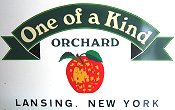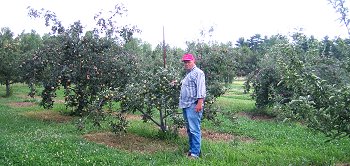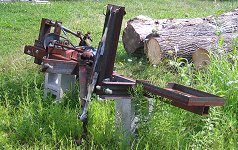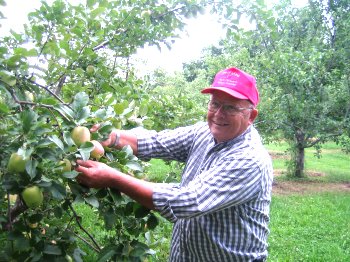- By Dan Veaner
- Business Profiles
 Print
Print  Ray Reynolds has been having a love affair for 25 years that his wife actually encourages. Reynolds owns the One Of A Kind Apple Orchard on Buck Road in Lansing. "My orchard is the love of my life," he says. "It's a very comfortable thing. I enjoy it. There is history. There are varieties that 99% of the people around this area have never known or heard of."
Ray Reynolds has been having a love affair for 25 years that his wife actually encourages. Reynolds owns the One Of A Kind Apple Orchard on Buck Road in Lansing. "My orchard is the love of my life," he says. "It's a very comfortable thing. I enjoy it. There is history. There are varieties that 99% of the people around this area have never known or heard of."And Reynolds is working on bringing many of them to Lansing. May, Pristine, Opalescent, Padukah, Sheet Nose, Margadale, Hudson's Golden Gem, Arkansas Black, Smokehouse, Yellow Transparent, Cox Orange Pippen, York Imperial, Gravenstein, and Nickojack are only a few of the 500 varieties in his orchard. Specializing in heirloom apples, he currently has 800 trees. His goal is to grow 1,000 varieties. To put this into perspective there are 7,000 apple varieties in the United States, with 17,000 around the world.
Reynolds lived on a farm for his first 25 years, where his family happened to grow apple trees next to the pigsty. A carpenter, he ran his own remodeling and repair business until he retired three years ago. He and his wife Barbara have lived at their current Buck Road home for 40 years ago, and later bought the six acres that make up the principal part of his orchard today. Today he has 36 rows of about 40 trees each. He says he has only filled four acres with trees so far, which means there is plenty of room for growth.

"We named the orchard 'One of a Kind' because when I started out I put one of everything in," he says. "A lot of these apples are great and people are asking for them, so I planted two and three trees of those kinds."
About 25 years ago he picked up an old Miller Nurseries catalog, and modern apple trees they offered -- Macintosh, Cortland, and Empire -- appealed to him. He planted those, but he wasn't nearly finished. The next year he bought every kind of antique apple tree the nursery offered. Soon he learned about other heirloom apple producers around the country and began corresponding with them. They were willing to send him varieties he didn't have.
Reynolds was paying $20 to $25 per tree, so he learned to graft to keep his expenses down. At first he got an acquaintance in a large Woolcott, NY orchard to graft for him. "Finally one year I went up to him, and he said, 'I'm really busy this year. You know enough now to go home and do it yourself,'" Reynolds recalls. "So I bought my root stock and came home and grafted my trees. And 85% of the trees I grafted grew!"
Reynolds likes to experiment with different kinds of root stocks, and he says that the results can be quite different even when the variety of apple is the same. He says he uses root stocks that are aggressive enough to withstand Lansing's clay-like soil. Sometimes he is attracted by the name of a variety, and likes to be surprised by the apples it produces. "A Pink Pearl -- I didn't know it was pink on the inside until I cut it open," he says. "Rosebud -- that's red on the inside. I have one that has my wife's name, a Barbara. We don't know what it's going to taste like. I planted a Michelin because of the tire name. It would be better to eat the tire! It's a terrible tasting apple!"
 |  |  |
| A baby tree (left) starts at about a foot high, and will produce apples after four years. Reynolds invented a special rototiller (center) and an elevator for picking apples (right) that he built himself from scrap materials. | ||
In addition to tinkering with varieties of apples, he has created machines to help him maintain his orchard. About three years ago Reynolds fabricated a hydraulic elevator on wheels that he attaches to his tractor. He hauls it below a tree, then stands on the platform and it elevates him as much as 11 feet to pick the fruit. That replaces the conventional three-legged ladders he used to use. He also came up with a rototiller that is configured to pull up weeds around baby apple trees. He says that saves on putting chemicals into the environment that would also be harmful to the trees.
"I'm coming around to being very environmental-friendly," he says. "I'm customer-friendly as far as putting out a good product that I don't have to worry about washing off and scrubbing. Now, I do do that, but I don't have to worry about it. "You do the math: one ounce of fungicide per 100 gallons of water. That will do 150 to 175 trees and the average tree puts out three to four bushels of apples, and an average bushel is 100 to 120 apples. So how much fungicide or pesticide just got on that apple? And you should wash an apple before you eat it."
Ask him about apples and he is a font of knowledge, especially about grafting, planting, and the history of apples. He says heirloom apples come from the 1940s and earlier. He even grows King David the Seventh apples that he can trace back to the 1500s.
He is quick to share stories about how varieties came to be. He explains that trees grown from seeds are unpredictable, turning out apples that may be from an ancestor of a modern variety, rather than the kind of apples the seed came from. "There was a grandmother named Granny Smith in New Zealand," he says. "She was peeling and coring apples for apple pies. She was throwing them out near a river, and they grew and grew and grew, and somebody tried one and said, 'This is delicious. We'll name it after you. We'll call it Granny Smith.'"
Reynolds sells his apples, along with peaches and plums grown by a 77 year old friend from Williamson, on the honor system. He washes the fruit and leaves it on stands and in coolers where you can pick out what you want and simply leave the money if he is not there when you get there. He says that there has been some stealing, but that most people are honest.

Ray Reynolds
He also donates apples to local sports teams, and loves teaching kids about apples. Earlier this year he invited 6th Grade science teacher Gwen Beck to bring her students to the orchard to learn about growing and grafting, and responsible use of chemicals. He gives apples to the Lansing varsity soccer teams, and leaves bags of apples for the track team athletes who run by his orchard. He sends apples to Southern Cayuga schools for field trips, and this year donated more than 20 bushels to the Lansing Food Pantry. The old saying, 'An apple a day keeps the doctor away' is not a bad idea," he says.
Reynolds has suffered multiple heart and cancer surgeries, and says his doctors look forward to the Spring when he can get out into the orchard because it has a restorative effect on him. And there is certainly a noticeable relaxation in his demeanor when he talks about his orchard. "My doctors say my apple trees are the best therapy I can get," he says. "One of them said if it wasn't for the apple trees I probably wouldn't be here."
He says his greatest fear is that there won't be someone to care for his trees when he is gone. He is hoping to find someone with an interest in heirloom apples who might continue it. But for now he is going strong, adding about 100 trees per year, working toward that goal of 1,000 varieties.
"It's a labor of love,'" he says. "I can go out here and plant this apple tree. And I see it grow. I can smell the blossoms. I can see the fruit grow, and I can pick an apple, heavy with dew, and chew on that. What more could a person want?"
----
v4i34



